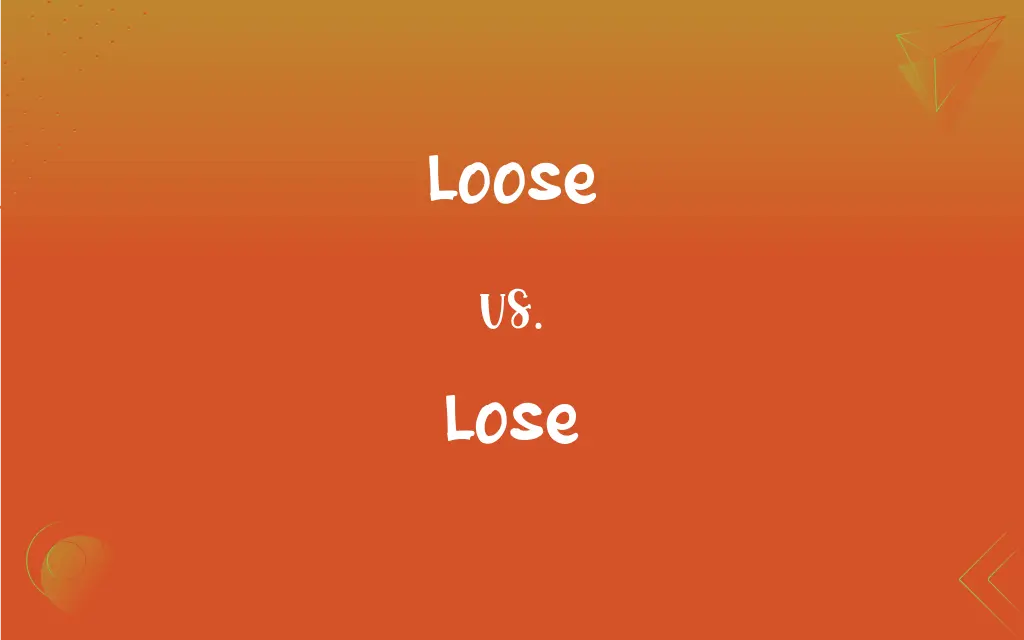Loose vs. Lose: What's the Difference?
Edited by Aimie Carlson || By Harlon Moss || Updated on October 25, 2023
Loose refers to something not tightly held or fastened, while lose means to misplace or be deprived of something.

Key Differences
Loose and lose are two words that are commonly confused in the English language. Loose is an adjective, typically describing something that isn't tightly held, fixed, or restrained. For example, you might have a loose tooth or a loose button on a shirt. On the other hand, lose is a verb. It describes the action of misplacing something or being deprived of something, like when you lose your keys or lose a game.
Loose can also relate to concepts beyond just physical objects. It can describe abstract concepts like a loose interpretation of rules or a story with a loose plot. Lose, in its context, can also be abstract. For instance, one can lose their way in life or lose their sense of purpose.
Both loose and lose have other meanings and can be used in various contexts. For instance, loose can mean to set free or release, like letting a bird loose from a cage. Lose, on its side, can mean failing to win, as in a team might lose a match or a person might lose a bet.
When trying to decide between loose and lose, consider the context. If you're describing something not being tight or firm, you'll likely want "loose." If you're talking about the action of misplacing or not winning, "lose" is the word to choose.
Comparison Chart
Part of Speech
Adjective (also can be a verb in some contexts)
Verb
ADVERTISEMENT
Meaning
Not tightly held, fastened, or constrained
To misplace or be deprived of
Example
A loose thread
To lose a game
Abstract Usage
A loose interpretation
Lose one's sense of direction
Secondary Meaning
To set free or release
Failing to win
Loose and Lose Definitions
Loose
Not dense or compact.
She wore her hair in a loose bun.
ADVERTISEMENT
Lose
To waste or fail to use.
Don't lose the opportunity to learn.
Loose
Lacking in restraint or strictness.
The teacher was loose with the classroom rules.
Lose
To suffer the loss or deprivation of.
He didn't want to lose his job.
Loose
Vague or not exact.
That's a loose interpretation of the law.
Lose
To fail to win or gain.
The team will lose if they don't improve.
Loose
Not firmly or tightly held in place.
The screw is loose in the hinge.
Lose
To be unable to find or have misplaced.
I always seem to lose my glasses.
Loose
Free from anything that confines or restrains.
Let the dogs loose in the yard.
Lose
To become free from or deprived of.
She started to lose her patience.
Loose
Not fastened, restrained, or contained
Loose bricks.
FAQs
How do I use "lose" when referring to a game?
You'd say, "We might lose the game."
What's a common phrase using "lose" about focus?
"Lose sight of."
Does "loose" ever mean "to set free"?
Yes, as in "let the birds loose."
Is "lose" used when talking about time?
Yes, like in "lose track of time."
What's the opposite of "lose" in a competition context?
Win.
What's a synonym for "loose" when talking about fit?
Baggy.
Does "loose" have a noun form?
Yes, "looseness."
Can "loose" describe someone's behavior?
Yes, like "loose morals."
Is "loose" an adjective or a verb?
"Loose" is primarily an adjective, but it can also be used as a verb in contexts like "loosing an arrow."
And "lose"?
"Lose" is pronounced like "luːz" rhyming with "shoes."
Can "lose" describe a decrease in something?
Yes, as in "You might lose interest."
Is there a phrase that uses "lose" about control?
Yes, "lose one's grip."
Can "lose" function as an adjective?
No, "lose" is a verb.
What's a common example of "loose"?
A common example is, "The button on my shirt is loose."
Can "loose" describe abstract concepts?
Yes, like in "a loose interpretation."
How do you pronounce "loose"?
It's pronounced like "luːs" rhyming with "moose."
Can "loose" describe clothing fit?
Yes, like in "The shirt is too loose on me."
Does "loose" relate to casual behavior?
Yes, as in "He's very loose with his spending."
What's a synonym for "lose" in terms of misplacing?
Misplace.
How do you use "lose" regarding misplacing items?
"I often lose my keys."
About Author
Written by
Harlon MossHarlon is a seasoned quality moderator and accomplished content writer for Difference Wiki. An alumnus of the prestigious University of California, he earned his degree in Computer Science. Leveraging his academic background, Harlon brings a meticulous and informed perspective to his work, ensuring content accuracy and excellence.
Edited by
Aimie CarlsonAimie Carlson, holding a master's degree in English literature, is a fervent English language enthusiast. She lends her writing talents to Difference Wiki, a prominent website that specializes in comparisons, offering readers insightful analyses that both captivate and inform.































































